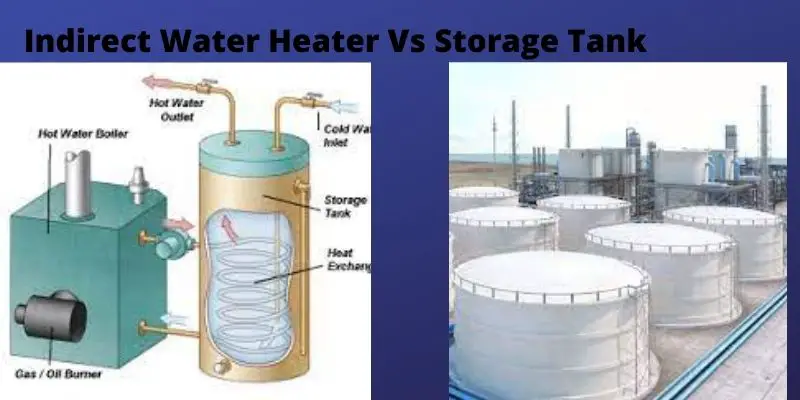Since water heaters are the most important equipment in our daily life, having some confusion about them is normal as they come with different types, sizes, and price tags.
Our previous article has broadly discussed some important topics such as direct vs. indirect heaters and what size indirect heater you need.
But in this article, we’ll only focus on one topic, “Indirect Water Heater Vs. Storage Tank ”, Together we will find out the differences between them with some additional tips.
So let’s get started!
Indirect Water Heater Vs. Storage Tank
An indirect heater is a common water heating system that uses your home’s existing power sources, such as a boiler, to heat the water, while a Storage tank water heater is also a type of water heater that works with either gas or electricity.
The storage tank water heater is a conventional heater that can hold up to 20-120 gallons of water. Most people believe that a storage water heater provides a consistent amount of water. That’s why people love using this model.
On the other hand, The people who want to save extra bills on their water heating system prefer an indirect water heater as it does not require a dedicated power source.
The Proper Comparison of A Hot Water Storage Tank and Indirect Water Heater
Storage Tank Water Heaters:

- A water storage tank works as a container in a water heating system.
- Since a storage-tank water heater is mostly used for heating a large amount of water at once, ultimately, it will take a long time!
- A storage-tank water heater helps you store hot water after heating, and you can use the remaining water for later use. However, water can become cold due to long storage, So you can heat the remaining water later and use it for multiple purposes.
- You may notice that the installation is a bit intricate
- If used carefully, they can go on for many days.
- These tend to be larger
- Gas and electricity are the primary power sources to run a storage tank heater.
- Due to their insulation tanks, the heated water will stay hot for a long time
- All the latest models of storage tanks are energy-efficient but not the older versions.
- Since people buy them to heat a large amount of water at once,
- They are affordable to buy
Indirect Water Heaters:
- If you use your indirect heater with a high-efficiency boiler and well-insulated tank, your heater can be an efficient choice for your home.
- One of the most common benefits of using an indirect heater is that it requires less maintenance.
- You don’t need to have any additional fuel lines to run the heater.
- It has higher recovery rates than a storage tank heater.
- Easy to install and cost-effective.
- Available in different sizes.
People Also Ask
What is an indirect storage tank?
An indirect heater is not a single heating tool, and it’s a combination of different types of equipment. An indirect storage tank is a container existing on the heater to store the heated water.
What is an indirect-fired water heater?
It’s such a well-organized storage tank containing a central heat exchanger that helps heat the water quickly.
How long does an indirect water tank last?
Although it will completely depend on how frequently you use the heater and how strong your heater is, according to buildwithrise.com, an indirect heater can last for up to 15-20 years under normal use.
Is A Water Heater The Same As A Water Tank?
Without the tankless water heater, almost every type of heater has a tank in their system to store the heated water for later use, so not a water heater is the same as a water tank.
Summing-Up:
Although the overall topic was a bit complex, hopefully, we have succeeded in educating you on today’s topic, “Indirect Water Heater Vs. Storage Tank”.
If you’re a new homeowner and have some confusion about the difference between the indirect water heater and the tank, reading this blog post will give you a better idea.
1. Why water heater makes noise?
2. How much do water heaters cost?
3. How big of a water heater do I need?
4. What is the best water heater?

